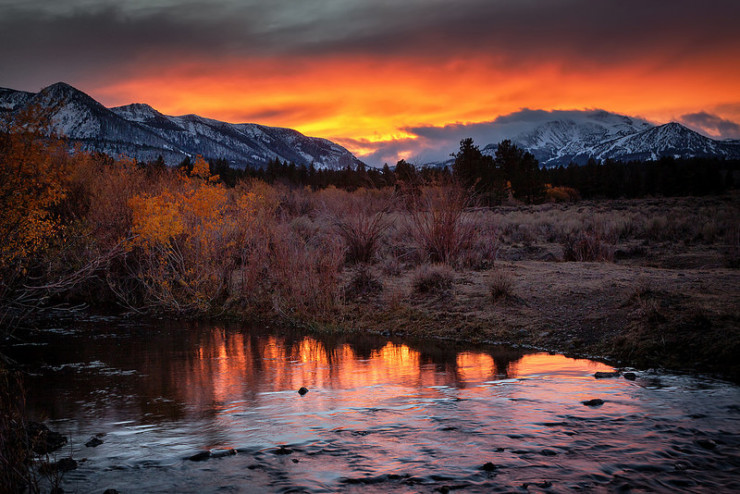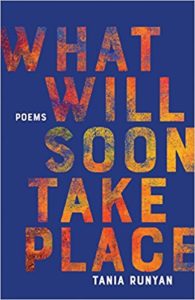
Religious faith has inspired poets for likely as long as faith and poetry have existed. About a third of the Old Testament is written in poetic form. The Greek and Roman poets were inspired by their pantheon of gods. In Christian times, a considerable amount of poetry made its way into church liturgy and popular culture as well; the Christmas carol “O Come, O Come, Emmanuel” is only one of many songs and poems that come from what are called the “O Antiphons,” songs of appeal sung at the Vespers service in the last week of Advent. And faith continues to inspire contemporary poets like Scott Cairns, Luci Shaw, Wendell Berry, Dana Gioia, Mark Jarman, Julia Kasdorf, and many more.
Tania Runyan is another contemporary poet inspired by faith, and her most recent collection demonstrates just how unusual and surprising that source of inspiration can be.

She begins with poems about Patmos, the island in the Aegean to which John was exiled and where he wrote Revelation. The subjects and themes move to the letters to the seven churches; the images of the scroll and the seven seals; the Four Horsemen of the Apocalypse; the major characters of John’s account—the antichrist, the “great whore of Babylon,” and the rider on the white horse; and the coming of the new kingdom. I almost laughed to see the title of two poems, both good examples of how she applies Revelation to the present—“The Great Harlot Takes a Selfie” and “The Antichrist at the Mall”—and then I considered what those titles and poems imply about all of us.
Consider “Ephesus,” a poem taken from the letter to the church at Ephesus, one of the seven churches cited by name in Revelation. The letter is a generally glowing account, until it says that the church has lost its first love. Here’s how Runyan considers losing that first love.
Ephesus
I was in love with God for one afternoon.
Twenty, alone on a beach, I dropped rocks
by the edge and watched the ocean wash
gray into blue, brown into red. An hour
of my crunching steps, the clack of pebbles,
the water’s rippling response. Never mind
invisibility. We were the only ones, and I
so intoxicating—sand-blown hair,
denim cut-offs, no reason to believe
anyone’s faith could dissolve. My prayers
were as certain as the stones I threw,
the answers as sure as the cove’s blue floor.

Tania Runyan
Runyan has published three previous collections of poetry: A Thousand Vessels (2011); Second Sky (2013), and Simple Weight (2013). She’s also the author of three non-fiction works: How to Read a Poem (2014), How to Write a Poem (2015), and How to Write a College Application Essay (2017). She’s also a rather amazing fiddle player (I can say that; I’ve heard her play).
What Will Soon Take Place is arresting and often jarring. It will make you smile and often squirm. And it suggests that we should perhaps be living our lives as if each present day is the end times.
Related:
Tania Runyan’s A Thousand Vessels: Poems.
Photo by Pacheco, Creative Commons, via Flickr. Post by Glynn Young, author of the novels Dancing Priest, A Light Shining, and the newly published Dancing King, and Poetry at Work.
__________________________

“I require all our incoming poetry students—in the MFA I direct—to buy and read this book.”
—Jeanetta Calhoun Mish
- Poets and Poems: Sandra Marchetti and “Diorama” - April 24, 2025
- Poets and Poems: Christina Cook and “Roaming the Labyrinth” - April 22, 2025
- Longfellow’s “Paul Revere’s Ride”: Creating a National Legend - April 17, 2025
Debbie Crawford says
I have added it to my Amazon list. I love learning about poets who are inspired by the Bible.
Glynn says
And it’s one of the most difficult books of the Bible, too. Thanks for the comment, Debbie!
Mary Sayler says
Beautiful! Thanks, Glynn. You find the best books to read!
Glynn says
When I saw this one was coming out, I couldn’t wait to read it. And she does play a mean fiddle!
Maureen says
So pleased to see this new arrival. Congratulations to Tania, and a thank you to you, Glynn, for the introduction to the new collection.
Bethany R. says
Interesting post and collection. (I can also attest to the amazing fiddling!) Love how Tania Runyan makes Revelation feel down-to-earth in Ephesus. #denimcutoffs
Sandra Heska King says
I have to add this one to my collection. #TanyaFan